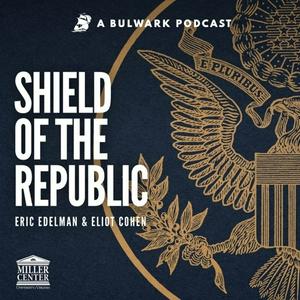Eric and Eliot welcome back friend of the show Kori Schake, Senior Fellow and Director of Foreign and Defense Policy Studies at the American Enterprise Institute, to discuss her new book, The State and the Soldier: A History of Civil-Military Relations in the United States. They explore Kori’s critique of Samuel Huntington’s canonical study, The Soldier and the State, examine George Washington’s consequential resignation of his commission before the Continental Congress, and discuss the role of charismatic but unhinged military figures in American politics, as well as the relationship between civilians and military officers when executing orders.
The State and the Soldier: A History of Civil-Military Relations in the United States:
https://a.co/d/0biIePiP
The Soldier and the State: The Theory and Politics of Civil–Military Relations:
https://a.co/d/0dsgKaLr
Shield of the Republic is a Bulwark podcast co-sponsored by the Miller Center of Public Affairs at the University of Virginia.


